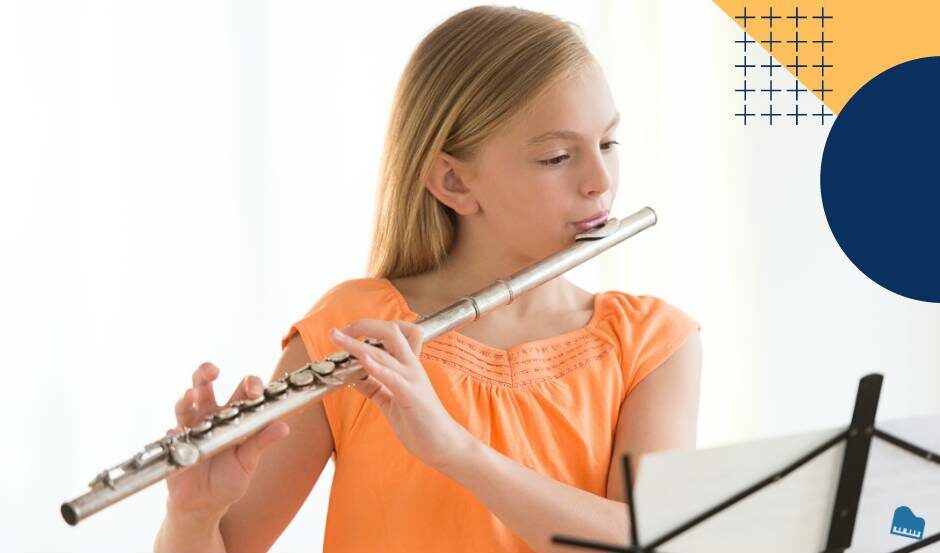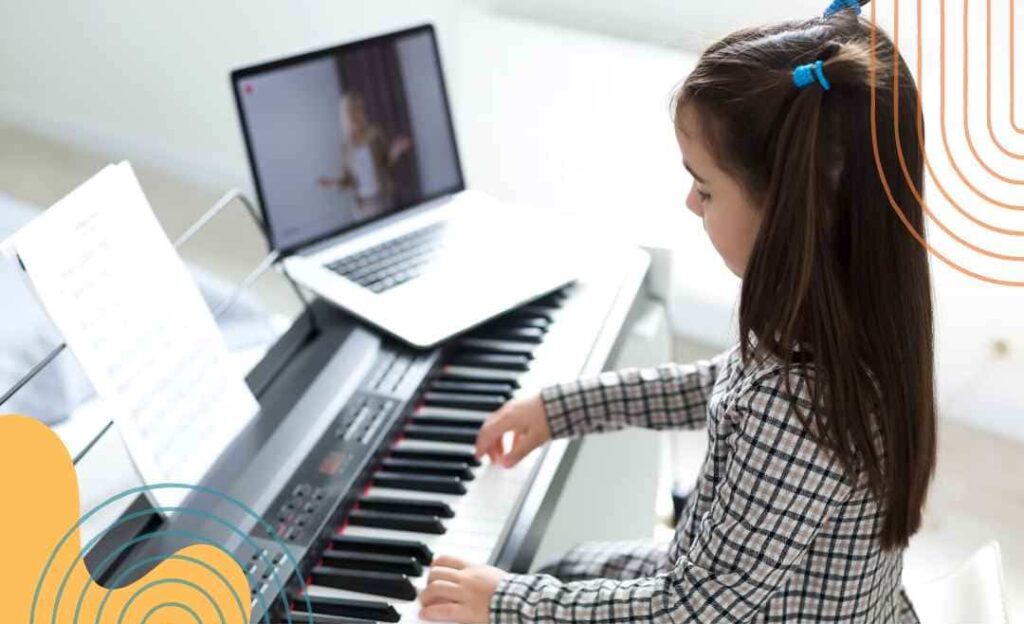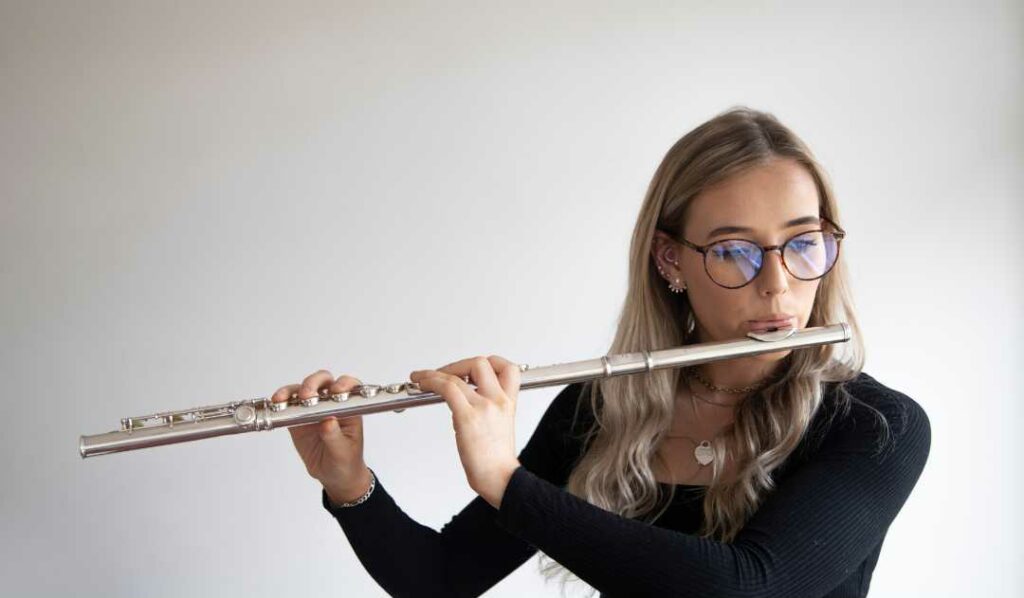Getting Started with Flute
What's the Best Age to Learn Flute?

Rose Park
updated 5/4/25 • 4 min read
The best age to start flute:
If you’re thinking about flute lessons for your child, it helps to know the best time to get started. Most children are physically ready to play the flute or piccolo around 9 to 11 years old. At this age, they’re usually able to hold the instrument and manage the breath control it requires.
Still, age isn’t everything—many people fall in love with the flute as teens or adults. No matter your age, learning the flute can be a fun and fulfilling journey.
Try a Half Hour Flute Lesson Completely For Free!
60+
Instructors
50,000+
Lessons taught
4.9/5 ⭐⭐⭐⭐⭐
Average lesson rating
Table of Contents
4 things to consider when starting flute
Do you have a quiet, dedicated space to play flute?
Creating a focused, quiet space for practicing the flute is key to getting the most out of your lessons. This is even more important for online flute lessons, where distractions or interruptions can lower the quality of your learning.
Is the student motivated to play flute?
Learning to play the flute takes time, dedication, and money, especially for beginners. If your child doesn’t show any interest in playing the flute or participating in the school orchestra, pushing them to take lessons can potentially do more harm than good. Besides, they won’t be motivated enough to practice the flute, which will slow down the learning process and frustrate both the child and the teacher.
Try to encourage your child’s interests. There are plenty of other engaging activities that your child might actually love to try and learn. And if they do express an interest in music, consider other instruments besides the flute.

Do you have a flute in hand?
To get started with flute lessons—whether online or in person—you’ll need to have an instrument. If the student doesn’t have one yet, a beginner flute in the $300–$600 range is a good place to start. As they continue learning and show interest, you can always consider upgrading to a more advanced model later on.
Are regular flute lessons within your budget?
Based on our article on flute lesson costs, the average price for flute lesson is $65 per hour. That being said, it’s important to find a qualified teacher who charges a reasonable cost and provides your child a great flute instruction.
You can find exceptional flute instructors with reasonable pricing online. At Lesson With You, we offer half-hour flute lessons for $35 with teachers who hold at least a Bachelor’s degree in flute from renowned music schools with extensive performance and teaching experience.
When is my child ready to start flute lessons?
Your child likes classical music
If your child enjoys listening to classical music, especially orchestral repertoire, it’s a great sign that they may be interested in playing the flute. Many young beginners are drawn to the flute because of its unique, beautiful sound and outstanding techniques.
The flute is suitable for various genres, including classical, church music, and contemporary music. Ask your child about their preferred styles of music and choose flute repertoire based on their interests.
Your child can hold the flute and breathe for a certain time
If your child has the strength to hold the flute and breathe properly for about 10 to 15 minutes, that’s a positive sign they’re ready for flute lessons. But if your child has weak forearms and struggles with breathing, starting with instruments like piano or singing can be great alternatives for developing a sense of harmony and rhythms.
Start Your Free Trial Lesson
Take a 30-minute complimentary lesson with exceptional teachers. Flexible scheduling, Competitive Pricing, No contracts required.
Your child can understand and follow directions
Learning the flute is an exciting journey for your child to learn mouth control (embouchure), rhythm, and tone production. Flute lessons typically include instruction on note reading, musical structure, and music theory, with the teacher offering guidance on techniques and breath control.
If your child can follow instructions and show readiness, they are prepared to start their flute journey! For children under 9 years old, parents can also join the lessons to provide extra support.
Your child can stay focused at least 15 minutes
Any music lessons typically last around 30 minutes, and during that time, your child will need to stay focused for about 15 to 20 minutes. Keeping good focus is great for improving your child’s musical skills and absorbing the details they learn during lessons.
If you’re not sure if your child can do it, you can help them practice focusing by engaging in activities they enjoy, like reading books, doing arts and crafts, or solving puzzles together.
Early flute learning and its long-term benefits
Flute lessons offer much more than just learning an instrument—especially when started early. Children gain confidence and pride in their progress, and they also pick up important problem-solving skills by figuring out how to improve their sound or fix a tricky passage.
As their skills grow, so do their opportunities: they might join a band or orchestra, play in recitals, or explore solo performance. Through it all, they’re also learning discipline, perseverance, and how to stay focused on long-term goals.
Starting young also helps students build strong fundamentals that they can continue to refine over time, all while enjoying the joy of making music.
I'm 50 years old - can I still learn flute?
Absolutely! Age is no barrier to learning the flute. Starting flute later in life has numerous benefits for anyone older than 40. It’s great for memory and finger strength. Plus, playing regularly is a great way to stay mentally sharp and fulfilled through musical happiness.

Explore LWY music lessons
How to find the best flute teacher
Finding the right, professional flute instructor can be a challenge when starting lessons. So, what are some common mistakes made by beginners?
- Starting with an ordinary flute instructor and then switching to a better one later
- Failing to thoroughly review the teacher’s educational background
- Learning from a teacher who also teaches other instruments like clarinet
- Taking flute lessons that charge significantly less than the average rate
5 tips to kickstart your flute journey
Maintain flute in good conditions
Taking care of your first instrument is a big responsibility, especially for young beginners. Remember to spend a few minutes after playing to clean the flute and remove any moisture. Here are some easy maintenance tips for flute players:
- Clean your flute regularly – use a soft cloth and a cleaning rod to remove moisture from your flute after each practice session.
- Oil your flute by applying a small amount of key oil to the moving parts of your flute to keep them lubricated and prevent rust.
- Make sure to brush your teeth before playing
- Keep two hand on your flute while playing to avoid any accidental drops.
- When you’re done playing, always store your flute in a dry and safe case to protect it.
Place the flute where you can easily access
The more accessible the flute is, the more likely you or your child will play and practice regularly. Instead of hiding the instrument away in a small room or attic, try placing it in one of the main bedrooms or study rooms. That way, you can easily play a few tunes whenever you have time.
Participate in musical events
With the flute, your child can become a part of various musical ensembles such as school orchestras, concert bands, woodwind orchestras, and church bands.
As a parent, you can inspire your child to engage in these musical communities after they have been taking lessons for approximately a year or two. It presents a wonderful opportunity for your child to develop and flourish by collaborating with musicians in group practice sessions and public performances.
Find and build a good practice routine
Helping your child find the right practice routine is important, especially when the child is new to everything. For beginners under 10, try a short and effective schedule that fits their school days. Start with 10 minutes of practice daily for a few weeks, and adjust as they get comfortable. This doesn’t include time for setting up the flute.
Children aged 9 to 11 can aim for around 20 minutes of practice. Starting with three times a week is a good start, and they can increase gradually. Remember, talking to the instructor can provide great guidance and support along the way!

Talk about lesson progress regularly
After taking a couple of weeks of flute lessons, check in with your child and ask how they’re doing it. Make sure they’re not just learning the skills, but also enjoying the process and staying motivated.
You can also ask if they need any help with techniques or music theory, so you can discuss it with their instructor. Take the time to listen to their stories, share the notes taken during the lessons, and be there to provide support throughout their learning progress.
How long does it actually take to learn flute?
Learning the flute takes time, and everyone progresses at their own pace. With regular lessons and consistent practice, most beginners can expect to learn the basics in about one to two years. For some, it might be quicker; for others, it may take a little longer—it all depends on how often you practice and the kind of guidance you receive
If you’re learning the flute as a hobby or hoping to join a local orchestra, a regular practice routine of about 20 to 25 minutes, three times a week, is a good starting point. Keep in mind, this time doesn’t include assembling or cleaning the instrument.
If you’re preparing for competitions or auditions, a more intensive practice schedule—averaging one to two hours per day—is recommended.
What are affordable flute options for beginners?
The best way to find an affordable flute is to consult with a professional instructor or local music store salesperson. Here are some options that are great match for beginners:
- Yamaha YFL-222 Intermediate Flute: Costs around $600. Yamaha is a well-known brand for producing high-quality musical instruments at various price points. The YFL-222 is a popular choice for beginners due to its durability.
- Jean Paul FL-220 Student Flute: Costs around $250. The Jean Paul FL-220 is a great beginner flute known for its affordability and decent quality.
How much do flute lessons cost?
The average price for a one-hour flute lesson is $65, based on our lesson pricing guide. Online flute lessons between $25-40 for a half hour lesson, and local private lessons averages $40 for a half hour session. There may be additional expenses, such as purchasing or renting a flute, buying accessories like cleaning kits, lesson book, and maintenance costs for the instrument.
Is it ever too late to start flute?
When it comes to learning flute, age doesn’t really matter, and the time it takes to master it varies from person to person. What matters is to get a high-quality instruction.
At Lesson With You, our expert instructors create personalized lesson plans suited to the musical needs and lifestyles of any flutists. With their guidance, anyone can elevate their flute skills at great prices.
The first trial lesson is FREE! No Contracts Ever.
Music Guides: Beginner to Advanced
Interested in a certain style?
Musical Theatre Singing Lessons | Classical singing Lessons | Rock singing Lessons | Country singing Lessons | Pop Singing Lessons
Classical Guitar Lessons | Acoustic Guitar Lessons | Jazz Guitar Lessons | Rock Guitar Lessons | Electric Guitar Lessons | R&B Guitar Lessons

Rose Park
Rose Park is a graduate of the Jacobs School of Music at Indiana University where she studied Piano Performance and Arts Administration, receiving both Bachelor's and Master's degrees before co-founding Lesson With You. As a pianist, Rose was a prizewinner in many international piano competitions and performed at various summer programs and festivals across the United States, Italy, and Japan.




